The photo is of a Cuban Trogon, el tocororo.
Translated by Regina Anavy
27 February 2014
English Translations of Cubans Writing From the Island
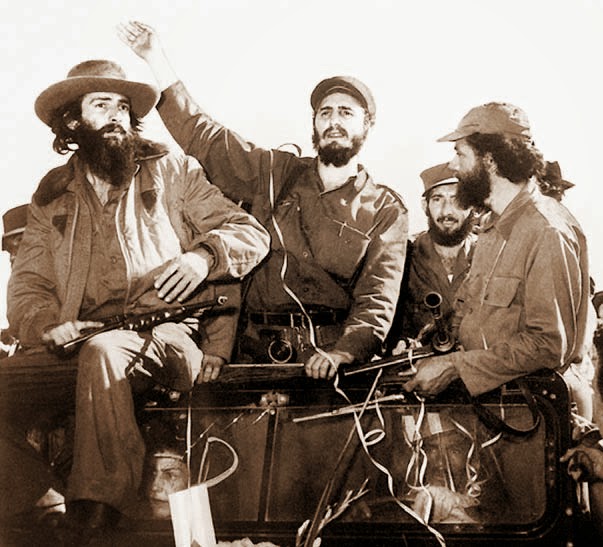
For years I tried to imagine his face, but it didn’t appear anywhere. He had been erased from the national history with meticulous cruelty. They airbrushed him out, even in one of the most iconic images of the Revolution, the one where he and Camilo Cienfuegos accompany Fidel on top of a Jeep, during the victorious entry into Havana.
In the middle of the last decade, Huber Matos was visiting Santo Domingo and they invited me to a meeting with the heroic commander. He was already a fragile cornflower, but kept intact his stature and his strength. When we shook hands he pressed mine firmly. I felt gripped by the bones in his hands.
It was hard for me to ask for the floor, I was intimidated by his glance and the weight of the history he carried on his shoulders. “I would just like to ask your forgiveness, commander,” I said to him. Then I told him of the hatred I had felt for him as a child. “To my generation they instilled in us that you were a traitor to the fatherland and responsible for the disappearance of Camilo [Cienfuegos].”
He stood up and gave me a hug. Again I felt myself gripped. “Thank you, son,” he said, very moved, almost in my ear. Although they couldn’t shoot him, they assassinated his reputation, which is the most cowardly method Fidel Castro has used to annul his adversaries. Because of this the young people in my country know very little about one of the bravest leaders of the Revolution.
The man who died today was one of the first Cubans who warned that that popular feat would turn itself into a shameful dictatorship. The day when history can tell it like it was, Huber Matos will once again climb up on that Jeep from which he never should have been removed. Then, without erasing anyone else, it will be perfectly clear who betrayed whom.
Camilo Venegas from his blog El Fogonero
27 February 2014
Letter from Hubert Matos to Fidel Castro
Camagüey, 19 October 1959
To Dr. Fidel Castro Ruz, Prime Minister, Havana
Compañero Fidel:
Today I have sent to the Chief of Staff, through regulation channels, a radiogram regarding my position in the Rebel Army. I am assured that this matter will be elevated to you for your solution and consider that it is my duty to inform you of the reasons why I have had to request my discharge from the army, explaining to you the following conclusions:
First: I do not desire to make myself an obstacle to the Revolution and I believe that having to adapt myself or cut myself off so as to do no harm, the honorable and revolutionary thing is to leave.
Second: From an elementary modesty I must relinquish all responsibility within the ranks of the Revolution, after learning of some of your comments in the conversation you had with the compañeros Agramonte and Fernández Vilá, Provincial coordinators in Camagüey and Havana respectively: while this conversation did not mention my name, you were thinking of me. I also believe that after replacing Duque and other changes, anyone who has been talking frankly with you about the communist problem should leave before they are removed. continue reading
Third: I only conceive of the triumph of the Revolution with a united people, willing to endure great sacrifices… because a thousand economic and political problems will come… and this united and combative people will not manage or sustain itself if it is not based on a program and satisfies equally their interests and their sentiments, and with a leadership that captures the Cuban situation in its proper dimension and not as a question of ideologies nor struggles among groups.
If you want the Revolution to triumph, say where we are going and how we will get there, listening less to gossip and intrigues and not branding as reactionaries or conspirators those who honorably state their opinions of these things.
On the other hand, to use insinuation to compromise figures who are clean and disinterested who did not appear on stage on the first of January, but who were present at the hour of sacrifice and who took on this work for pure idealism, is also unfair and unjust, and it is good to remember that great men begin to decline when they cease to just.
I want to clarify that none of this is brought forward to hurt you, or to hurt other people: I say what I feel and what I think with the right that attends my condition as a Cuban sacrificing for a better Cuba. because although you silence my name when you speak and those who have fought and are fighting alongside you, the truth is that I have done for Cuba all that I could, not and forever.
I did not organize the Cieneguilla expedition, which was so helpful in the resistance of the spring offensive for which you thanked me, but to defend the rights of my people, and I am very content to have completed the mission you entrusted me with at the head of one of the columns of the Rebel Army that fought the most battles. As I am very glad to have organized a province as you ordered.
I think that I have worked hard and it satisfies me because regardless of the respect I have earned from those who have seen me close up, the men who know to dedicated their efforts to achieve the collective good, I enjoy the fatigue proportioned by being consecrated to the service of the common interest. And this work that I have enumerated is not mine personally, but a product of the efforts of some few who, like me, have known to do their duty.
Well, if after all this I’m thought to be ambitious or there are insinuations that I am conspiring, there are reasons to leave, if not to regret have been one of the many compañeros who fell in this effort.
I also want you to understand that this determination, well thought out, is irrevocable, so that I ask you not as Commander Huber Matos, but simply as one of your compañeros in the Sierra — do you remember? From those who came fully prepared to die following your orders, may you respond to my request as soon as possible, allowing me to return to my home as a civilian without my children having to hear later, in the street, that their father was a deserter or traitor.
Desiring every kind of success for you and your revolutionary projects and desires, and for the country — the agony and duty of all — I remain as always your compañero,
Huber Matos, 1959
Obituary
Huber Matos died on the morning of 27 February in Miami. On the 25th he was admitted to Kendall Regional Hospital where he was diagnosed with a massive heart attack. On the 26th he asked that they withdraw his respirator because he wanted to say goodbye to his wife María Luisa Araluce and to his children and grandchildren.
During the day he received calls from Cuba and the main leaders of his party, the Independent and Democratic Cuba (CID) movement, who assured him the organization would not rest until the island is free.
Activists in Holguín sang the national anthem to him and members of the organization throughout Cuba were notified of the situation and of the commitment of their leader. His last words were: “The struggle continues. Viva Cuba Libre!”
Huber Matos left a political testament and a letter to Venezuelans. There will be a service for him in Miami on Sunday, 2 March, and he asked to be taken to Costa Rica, the country that sheltered him when he went into exile the first time during the Revolutionary struggle in 1957. It was from Costa Rica where he left for the Sierra Maestra to join the guerrilla war, and to this nation that he returned after spending two decades in prison in 1979.
“I want to return to Cuba from the same land whose people always showed me solidarity and affection, I want to rest in the earth of Costa Rica until Cuba is free and from there go to Yara, to accompany my mother and reunite with my father and with Cubans.”
Huber Matos Benítez was born in Yara, Cuba, in 1918. He earned his PhD at the University of Havana in 1944 and was a member of the Orthodox Party.
He resigned his position as Commander in 1959 in protest against the communist government’s deviation from the democratic principles of the Revolution.
Fidel Castro condemned him to twenty years in prison in a trial in December 1959, a sentence which Matos served to the last day.
His autobiography, “How the Night Came” (2002), describes his rupture with Castro, his trial and his years of prison.
27 February 2014, Cubanet
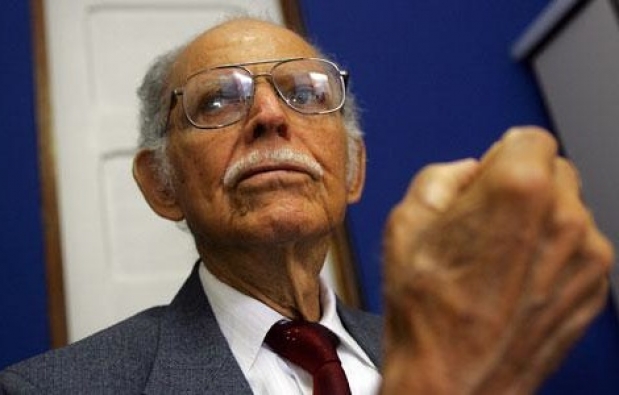
Former commander of the Cuban revolution Huber Matos Benítez, one of the most important figures of the opposition to the regime of the Castros, died early Thursday morning in a Miami hospital, reported his organization Independent and Democratic Cuba (CID). He was 95.
Matos (born in Yara, Granma province, on November 26, 1918) had been admitted two days earlier to Kendall Regional Hospital “where he was diagnosed with a massive heart attack” according to the CID report.
“On the 26th he asked to be disconnected from breathing equipment because he wanted to say farewell to his wife María Luisa Araluce, his children and grandchildren,” it added.
The organization said that during his hospitalization Matos received call from Cuba from the principal leaders of his party, “who affirmed that the organization would not rest until the island was free.” continue reading
According to CID, shortly before he died Matos declared “The fight goes on. Long live free Cuba!”
There will be a wake in Miami next Sunday for the former commander, who participated in the struggles that brought Fidel Castro to power and then spent 20 years in prison on the island for dissenting from the direction that the regime took.
CID said that Matos requested that his body be taken to Costa Rica, the country that welcomed him when he was first exiled in 1957 and from which he went to the Sierra Maestra to join Fidel Castro’s men.
Costa Rica was also Matos’s first destination in 1979 when he was released after serving two decades of political imprisonment imposed by the regime.
“I want to make my trip back to Cuba from the same land whose people always showed me solidarity and affection; I want to rest on Costa Rican soil until Cuba is free and from there to Yara, to rejoin my mother and my father and all Cubans,” Matos explained about his wishes.
Huber Matos, a school teacher, opposed the dictatorship of Fulgencio Batista. He was captured in 1957 for participating in operations providing logistical support to the rebels who were in the Sierra Maestra, but managed to escape into exile in Costa Rica.
In the Central American country he gathered weapons that arrived on a cargo plane in the Sierra Maestra and were instrumental in the offensive against Batista’s troops.
Because of his courage and leadership, Matos was the rebel who rose fastest through the ranks to commander, as head of the Antonio Guiteras 9th Column, in charge of the positioning, surrender, and capture of the city of Santiago de Cuba.
In 1959 he was named Commander of the Army in Camaguey province. Having discussed several times with Fidel Castro the increasing alignment of the revolution with communism, he resigned, stating that this was a betrayal of the democratic principles that the Revolution had promised the Cuban people. In response, Castro ordered his arrest on October 21, 1959, a week before the mysterious disappearance of Camilo Cienfuegos, who according Matos shared his concerns.
Matos was subjected to a summary trial for sedition in December 1959. During the process, he insisted on denouncing the deviation from the goal of the revolutionary movement for which he and others had risked their lives.
He was sentenced to twenty years in prison, which he served in full.
In exile, Matos tirelessly denounced the betrayal by the Castro regime.
In 1980 in Caracas he founded Independent and Democratic Cuba, with social democratic leanings, today headquartered in Miami, and claiming activists throughout the island.
In his autobiography How Came the Night, which, according to CID has sold over 100,000 copies and that circulates clandestinely in Cuba, Matos recounts in detail his participation in the revolutionary army, his subsequent imprisonment and the tortures to which he was subjected.
Diario di Cuba, 27 February 2014
Translated by Tomás A.
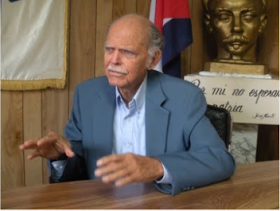

 Huber Matos died on the morning of 27 February in Miami. On the 25th he was admitted to Kendall Regional Hospital where he was diagnosed with a massive heart attack. On the 26th he asked that they withdraw his respirator because he wanted to say goodbye to his wife María Luisa Araluce and to his children and grandchildren. During the day he received calls from Cuba and the main leaders of his party, the Independent and Democratic Cuba (CID) movement, who assured him the organization would not rest until the island is free.
Huber Matos died on the morning of 27 February in Miami. On the 25th he was admitted to Kendall Regional Hospital where he was diagnosed with a massive heart attack. On the 26th he asked that they withdraw his respirator because he wanted to say goodbye to his wife María Luisa Araluce and to his children and grandchildren. During the day he received calls from Cuba and the main leaders of his party, the Independent and Democratic Cuba (CID) movement, who assured him the organization would not rest until the island is free.
Activists in Holguín sang the national anthem to him and members of the organization throughout Cuba were notified of the situation and of the commitment of their leader. His last words were: “The struggle continues. Viva Cuba Libre!”
Huber Matos left a political testament and a letter to Venezuelans. There will be a service for him in Miami on Sunday, 2 March, and he asked to be taken to Costa Rica, the country that sheltered him when he went into exile the first time during the Revolutionary struggle in 1957. It was from Costa Rica where he left for the Sierra Maestra to join the guerrilla war, and to this nation that he returned after spending two decades in prison in 1979.
“I want to return to Cuba from the same land whose people always showed me solidarity and affection, I want to rest in the earth of Costa Rica until Cuba is free and from there go to Yara, to accompany my mother and reunite with my father and with Cubans.”
 Huber Matos Benítez was born in Yara, Cuba, on 26 November 1918. He was a schoolteacher turned Revolutionary from his opposition to the dictatorship of Fulgencio Batista. In 1957, during one of the rebels’ logistical support operations, Matos was captured by Batista’s army in the Sierra Maestra area, but he was able to escape and go into exile in Costa Rica.
Huber Matos Benítez was born in Yara, Cuba, on 26 November 1918. He was a schoolteacher turned Revolutionary from his opposition to the dictatorship of Fulgencio Batista. In 1957, during one of the rebels’ logistical support operations, Matos was captured by Batista’s army in the Sierra Maestra area, but he was able to escape and go into exile in Costa Rica.
There, with the support of president José Figueres, he raised arms with which he landed in a cargo plane in the Sierra Maestra. These arms were decisive for the triumph of the small and poorly equipped Rebel Army against the offensive launched by Batista in 1958. For his courage and leadership in the guerrilla struggle, Matos was the rebel who rose most quickly to commander, as head of the Antonio Guiteras Column 9.
The frequent battles and triumphs of this column converted Huber Matos and his men into a legend. Column 9 was in charge of the siege, surrender and taking of the city of Santiago, a deciding action in the final victory of the revolutionary movement. Photographs of Fidel Castro’s triumphant entry into Havana show Huber Matos and Camilo Cienfuegos at his side.
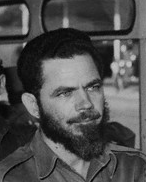 In 1959 Matos was named Army Commander in Camagüey province. After having discussed several times with Fidel Castro the growing alignment of the process with Communism, he renounced it, stating that this constituted a betrayal of the democratic principles of the Revolution as they had been promised to the Cuban people. In response, Castro ordered his arrest on 21 October 1959.
In 1959 Matos was named Army Commander in Camagüey province. After having discussed several times with Fidel Castro the growing alignment of the process with Communism, he renounced it, stating that this constituted a betrayal of the democratic principles of the Revolution as they had been promised to the Cuban people. In response, Castro ordered his arrest on 21 October 1959.
A week after his detention Camilo Cienfuegos, who shared Matos’ concern, mysteriously disappeared with his plane and pilot and they were never found.
During the summary trial for sedition in December 1959, Matos insisted on denouncing the deviation from the objective of the Revolutionary Movement for which he and so many others had risked their lives. He was sentenced to twenty years in prison, which he served in rebellion until the last day in 1979.
When he left prison, a representative of the Costa Rican government traveled to Cuba to accompany him on his trip to Costa Rica, where a large group of Cubans met him at the airport, along with the president Rodrigo Carazo, José Figueres and Oscar Arias.
From exile, he worked tenaciously to denounce the Castro regime. This led him to found, in 1980 in Caracas, Venezuela, the Independent and Democratic Cuba movement (CID), which today has a large membership organized in delegations throughout the entire island. Members of the CID are frequently harassed, imprisoned, and at times tortured by the Cuban authorities.
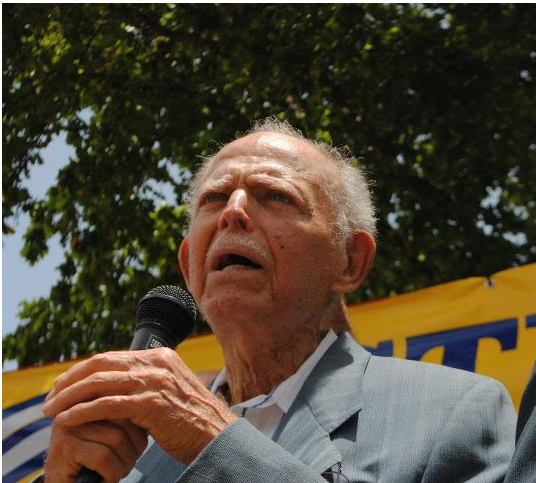 In his autobiographical book “How the Night Came,” which has sold more than 100,000 copies and which circulates clandestinely in Cuba, Matos relates the details of his participation in the Revolutionary army and his subsequent imprisonment, in which he was subjected to every kind of torture.
In his autobiographical book “How the Night Came,” which has sold more than 100,000 copies and which circulates clandestinely in Cuba, Matos relates the details of his participation in the Revolutionary army and his subsequent imprisonment, in which he was subjected to every kind of torture.
As Secretary General of the CID, from his base in Miami, Florida, Huber Matos engaged in intense activity reporting and campaigning in the United States, Latin America and Europe. In 2002 his social-democratic party published the Project of the New Republic, which has five key programmatic fundamentals:
1. Independence and sovereignty
2. Multiparty democracy
3. Free market economy
4. Human rights and social justice.
5. Latin American and continental integration
In addition, in 2011 the CID published a draft Constitution that guarantees the exercise of democratic freedoms and respect for human rights for all the inhabitants of the island, and includes a variety of provisions on education, social welfare, the economy and the environment.
Commander Matos qualified as a teacher in Santiago de Cuba and received a PhD in Teaching from the University of Havana.
Rogelio Matos Araluce 1-321-759-8066, rogeliomatos@gmail.com
Huber Matos Garsault 1-305-906-1950, hubermatos@hotmail.com
27 February 2014
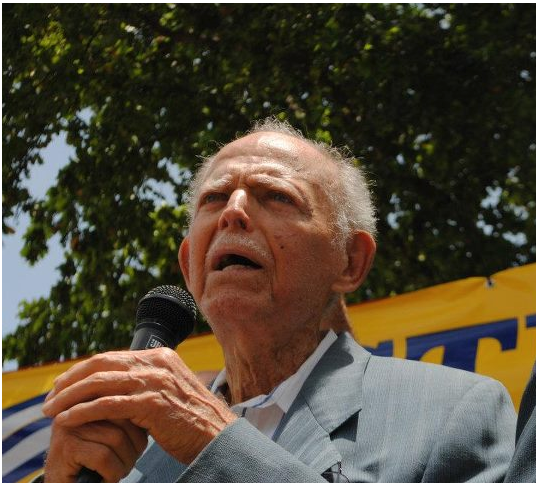
Cubans have been fighting against the dictatorship for more than half a century and this should be a source of pride, not shame. We have never given up, year after year, generation after generation many brave Cubans have refused to capitulate. Whoever says we’ve done nothing is wrong, we have done a great deal and continue doing it.
And all that has been done has been done against a regime that has had the support of much of the free world. Cubans have fought against dictatorship and against the Soviet empire that backed it until its end in 1989. We have also struggled against the indifference of democratic governments, against their indifference and in many cases against their complicity.
We have resisted for decades against the disinformation of the majority of the newspapers and journalists in the democratic world who have supported or been apologists for Castro. And despite this struggle against much of the world we have not let ourselves be beaten. It is not true that we’ve accomplished nothing, we’ve accomplished a great deal. All the sacrifice of a generation has made the following generation, or at least a part of it, to continue taking up the flag and defending freedom, respect for human rights and democracy.
Those who say we have not accomplished anything are ignoring that it has been the resistance of thousands and the sacrifices of thousands that have maintained the torch of freedom, lighting the path and the future. continue reading
Those who say that we have not done anything should reconsider their fatalism. They must understand that fear in Cuba and pessimism in the exile are the best weapons the enemy Castro regime has against the struggle for democracy. The dictatorship wants a fearful people and a pessimistic exile morally defeated. They want fear in Cuba and fatalism abroad because they fear the people on the island the people in exile.
For this, my compatriots, I speak as a man of 95 years who spent two decades in prison. Now is not the time to back off, it is the time to find in our souls and our hearts all the strength and all the optimism we need to bury the Castro regime. When someone tells you that we have done nothing and we can’t do anything, tell them that this is what the dictatorship wants us to think.
That the dictatorship wants fear on the island and defeatism abroad. Because they know that the day when the exile has faith and supports those who struggle, is the day the fear on the island will be lost the quickest. The dictatorship knows that to the extent that the people on the island lose their fear, in the exile negativity, fatalism and paralysis weaken. We can not ask the people to rise up if those of us living in freedom do not rebel against our lack of faith, against our passivity.
My fellow Cubans, we remember a Roman poet who centuries ago stated a great truth:
“Whoever loses their faith has nothing more to lose.”
19 January 2014